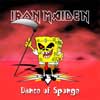 THE LOGIC OF THE SPONGE:
THE LOGIC OF THE SPONGE:Anarchists have often used an argument against "political action" as opposed to "direct action" that goes as follows:
"In struggling for and eventually gaining political power in pursuit of certain goals such social justice, workers' rights, etc. the successful "revolutionaries" become merely a mirror reflexion of the rulers that they previously opposed."
The usual justification for this argument is any number of modifications of the old adage that "power corrupts...". Very true, and few except aspiring new rulers fail to see the truth of this cynical but realistic view.
There's another way, however, to look at the matter. I call it "The Logic of the Sponge". It doesn't involve "corruption" at all, though real corruption is certainly ever present in any political enterprise, no matter how "noble" the professed goals of that enterprise are. In actual point of fact it has probably been centuries !!! since their was a ruling class or political caste that didn't try and cloak its naked power in high sounding rhetoric. From Idi Amin to the Khymer Rouge, to Pinochet, to the present US government, to Castro, to Stalin and Mao, to Hitler to every example you can think of every brutal regime has cloaked its intentions with some "greater good".
Individual corruption certainly accounts for at least "some" of the faults of such regimes. The ruling class of Cuba, for instance, certainly "lives better" than the average Cuban. But there is a greater source of what goes wrong when people seek power "for the greater good". The simple exercise of power has its own deadly habitual routine that seems an inevitability to anyone ensconced in a position to exercise power. the vast majority of Nazis were very much like the "good Marxists" of any of the last century's "people's paradise". They promoted the function of the machine that ground say 50 million Chinese to death just because "it was the way that it was done".
The "Sponge" absorbs its good intentioned invaders. One doesn't have to invoke some innate depravity of human nature to explain why revolutions "eat their own" (and a goodly chunk of other people besides). The pure force of habit, routine and an overwhelming social pressure to conform does the greatest amount of the job.
This is not as "unknown" as it may appear. The example of China, which has the highest death toll of the failed experiments of Marxism in action, is very apt. China has been conquered from outside on more than one occasion. In the long term, however, the culture of China has ended up absorbing the invaders like a great sponge. The invaders became habituated to the Chinese way of doing things and became as Chinese as the Chinese. China was a "great sponge" with tens of millions of citizens who eventually acculturated the invaders to behave in a fashion typical of the tradition. The interlude of Marxism in recent history may have been the bloodiest as the carriers of the Western ideology called Marxism were more detached from human sympathy than the Mongols or the Manchus, but in an historical perspective the era of mass slaughter and "ideological struggle" in recent Chinese history may have been shorter than the time it took China to absorb previous invaders.
China is hardly unique in this sponge ability. India did the same to many of its invaders. The Roman Empire survived for centuries by absorbing its invaders, and even the theoretical end of the Western Roman Empire left much of the ideology and culture of Rome very much alive and thriving.
Government is as much a sponge as Chinese, Roman or Indian culture. It has its ways of doing things that those who "conquer the state" become very much accustomed to despite whatever good intentions they may have. As a tool to create equality, justice, freedom,etc. it has a "very blunt edge". The use of this tool demands its own manner of handling that soon becomes both habit and the "common sense" of the tool users. One doesn't have to postulate either sadism or greed to explain how previous governmental changes failed. The sponge absorbed the threat thrown at it.
Molly
No comments:
Post a Comment